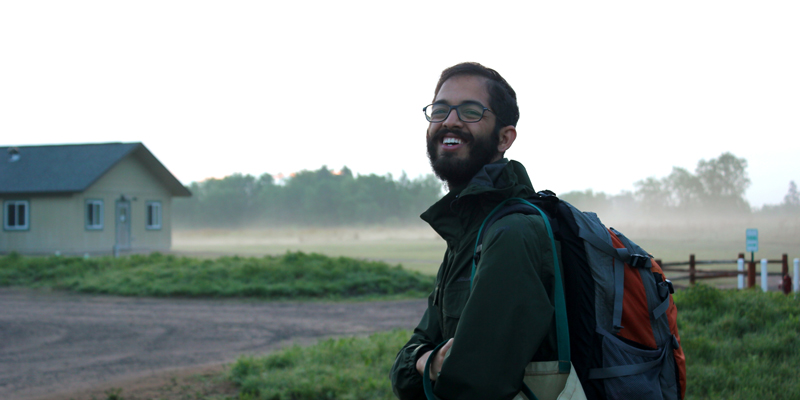Graduate student Siddharth Bharath Iyengar received the University’s 2019 Outstanding Community Service Award for his work at the intersection of social and environmental justice and science.

Siddharth Bharath Iyengar’s interest in community is expansive. As an Ecology, Evolution and Behavior graduate student, his research focuses on understanding how grassland plant communities are affected by rainfall variation. His interest in community also extends beyond the field to social and environmental justice.
Earlier this year, the University of Minnesota awarded Iyengar its Outstanding Community Service Award, the highest honor the University gives to a student for community service. He received the recognition for his work planning events on campus related to social and environmental justice, co-creating a workshop series to encourage conversation on ways storytelling can impact science, being a part of building the Twin Cities chapter of Science for the People and helping organize the Twin Cities Social Justice Education Fair. We recently caught up with Iyengar to get his thoughts on the award and where he sees crossover between science and the social causes he champions.
What did it mean to you to receive this award?
I am deeply honored by and grateful to the community of people who came together to give me this award. I have mixed feelings about the way an award can individualize credit for what has truly been the work of many communities of committed collaborators all along. I hope that celebrating the award also honors and uplifts the contexts in which this work happened and recognizes the structures/environments that necessitate these actions.
Back in December, my dear friends, Julia and Maggie, decided to nominate me for this award. To make the nomination, they reached out to many friends, mentors and co-organizers who contributed generous words about what they saw as my contributions to community building. That compilation of messages from people I deeply admire, is a truly great gift that everyone involved gave me. This work has been my biggest learning experience, my most meaningful journey here, and deeply ties into what I want to do in my future.
Building a supportive community is important to you. What has that looked like for you on campus?
When I arrived in 2014, I joined two amazing communities and cohorts - in Ecology, Evolution and Behavior (EEB) and at the Interdisciplinary Center for the Study of Global Change (ICGC). EEB is an organized and caring community - cohorts bond through shared classes and activities, and community events keep us all seeing each other. ICGC showed and taught me that social justice, scholarship and activism are all intertwined. But supportive community is rare to find, because individual achievement, competition and narrow definitions of success are incentivised by our academic system. Taking classes with ICGC and the department of Gender Women and Sexuality Studies (GWSS) taught me about the role that histories of power, social difference and culture play in what our academic institutions of science are today. That led me to recognize that building supportive community has to be entwined with changing the cultures of the systems we occupy.
What role do you believe scientists should have in enacting social change?
I was surprised when I first encountered ‘Broader Impacts’ in a fellowship writing class here - that every aspect of social action that we were encouraged to engage in had to be claimable on a CV. In my time here, I realize that it’s not easy to work at the intersections of our personal, professional and political identities. Science communication and outreach rarely asks whose science is being done, and for whom, and therefore I’ve engaged very little with those more ‘traditional’ modes of social impact. If politics is about working collectively towards making just and sustainable futures, then science cannot be separate from it. And science has always happened within value systems and ways of knowing. For example, in the context of climate change scenarios, why are we comfortable modelling technocratic (and highly improbable) solutions of geoengineering and carbon sequestration, but don’t create scenarios where nations no longer have militaries, or where land is redistributed to peasant and smallholder farmers (look at the work of the CLARA alliance)? I feel like academia has inherited and ingrained a lot of narratives that constrain our imaginations and engagements with issues of social justice. I've been lucky to have peers and mentors who were not limited in this thinking.
As part of working towards that, I’ve co-created a series of workshops titled “Reconstructing our storytelling of the sciences”, which we are running a second round of this semester. I’ve also been a part of building the Twin Cities chapter of the Science for the People movement. If anyone is interested in knowing more about either, I’d be happy for them to contact me on iyeng029@umn.edu.